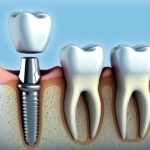If you want to replace your missing teeth with dental implants, considered optimal teeth replacement methods, it helps if you prepare yourself ahead of time for the dental implants procedure. Implant placement surgery replaces your tooth roots with titanium screw-like posts that appear and function like your natural roots.
Dental implant surgery offers a welcome alternative to dentures or bridgework that are ill-fitting and provide an option when the lack of natural tooth roots don’t permit building denture or bridgework tooth replacements.
How the tooth implant process proceeds depend on the type of implant you have chosen and your jawbone condition. Several procedures are involved in the full mouth dental implants procedure. The most significant benefit of dental implants is providing substantial support for your new teeth. The process requires your jawbone to integrate tightly around the implant. The bone healing requires approximately six to nine months, and the information is likely to scare you. However, let us explain why you mustn’t fear the dental implant procedure.
Why Do You Need Dental Implants?
You may need dental implants if you miss one or more teeth and search for replacements to prevent multiple issues that can bother you after you experience tooth loss. Dental implants are surgically placed into your jawbone to serve as missing tooth roots. The titanium in the implant integrates with your jawbone ensuring the implant won’t slip, cause any bone damage, or make a noise as fixed bridgework or dentures can. Furthermore, the material of the dental implant doesn’t decay like natural teeth.
You may be a candidate for dental implants if you have an adequate jawbone that has reached full growth or are prepared to have a bone graft if necessary. You must have healthy oral tissues and be free from any health conditions that may affect bone healing. You must commit several months to the procedure when having dental implants in Cambridge, ON, to replace missing teeth. The chances of a successful outcome with dental implants are higher if you are willing to quit or don’t smoke tobacco.
How Do You Prepare for Dental Implant Surgery?
Preparing for dental implant surgery involves many specialists besides the dentist in Cambridge. A doctor specializing in the mouth and jaw conditions, dentists specializing in treating structures to support the teeth, designing and fitting the artificial teeth, and even an ENT specialist.
You need to undergo a thorough evaluation when preparing for the tooth implant process because dental implants need more than one surgical procedure. X-rays and 3D images of your mouth and jaw are taken by the dentist, who also reviews your entire medical history. After the evaluation, a treatment plan is personalized for your situation, considering factors like how many teeth you want to have replaced, your jawbone’s condition, and your remaining teeth.
What Can You Expect When Having Dental Implants?
The procedure for dental implants is performed in stages in an outpatient setting. The dentist provides sufficient healing time in between operations to ensure the titanium post integrates with your jawbone. The entire process requires months from start to finish, with most of the time devoted to healing. Dentists combine some procedures on occasions if your situation demands it.
When performing implant placement surgery, your dentist cuts open your gums to expose your jawbone. The implant functions as an artificial tooth root and must therefore be implanted deep into the jawbone. Accordingly, holes are drilled in the jawbone to place the metal post.
You will still have a gap between your teeth from where your natural tooth is missing. Your dentist provides a temporary prosthetic in your mouth for appearance. The temporary appliance is removable for cleaning and when sleeping.
After having the implant placed, you must wait for osseointegration to complete when the jawbone unites with the surface of the implanted post. The process requires several months but helps to provide a stable base for your artificial tooth.
After osseointegration is complete, you undergo another surgery to have the abutment placed on which your artificial tooth will sit eventually.
Dental implants have a success rate of around 98 percent. You never have to worry about tooth decay or cavities affecting you after having dental implants inserted to replace missing teeth. However, you must continue maintaining proper dental hygiene and visit your dentist for six-monthly exams and cleanings without exceptions. Periodontal disease can still affect you to cause implant failure. If you had replacements for your natural teeth with dental implants, you might also care for them appropriately to ensure you don’t need additional replacements at high costs soon.






